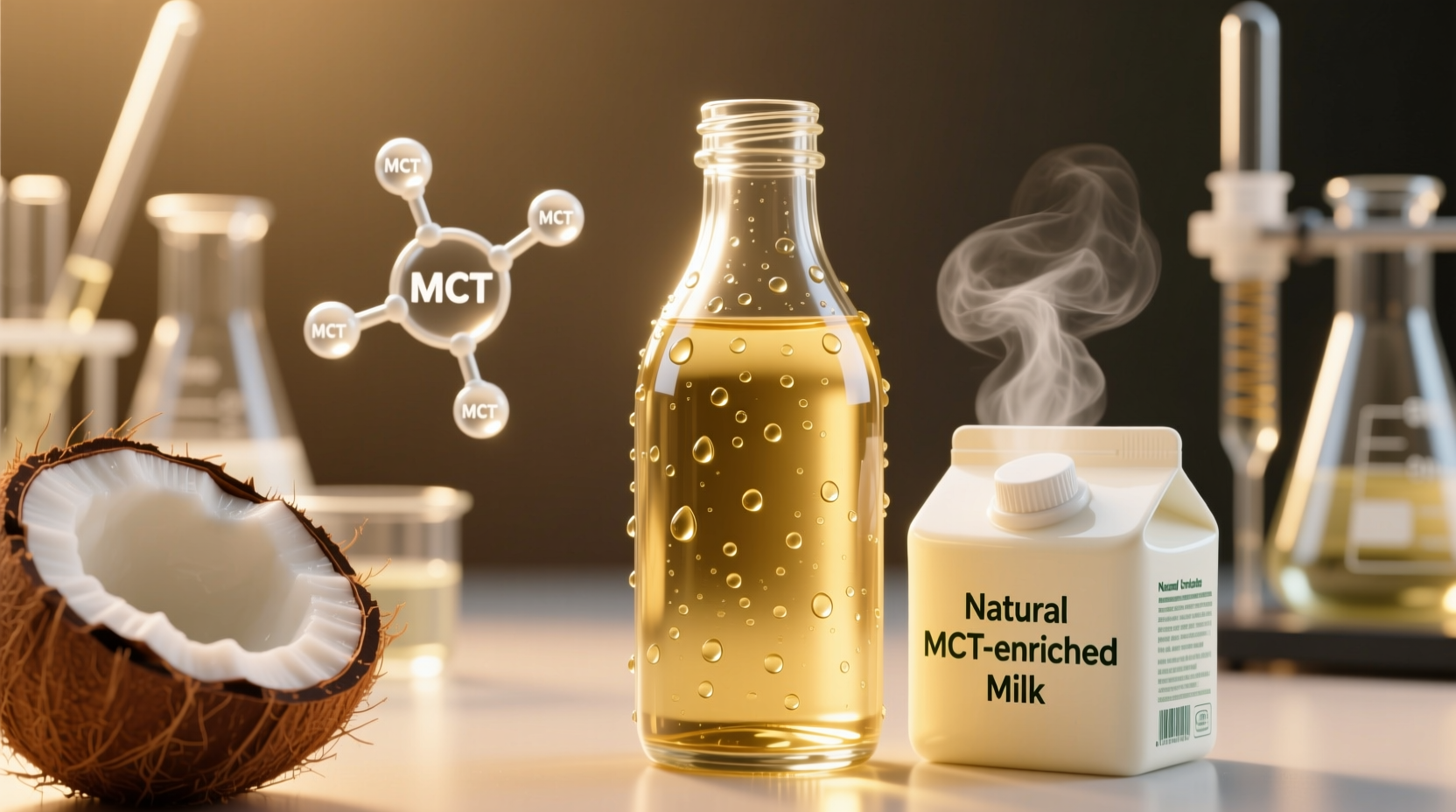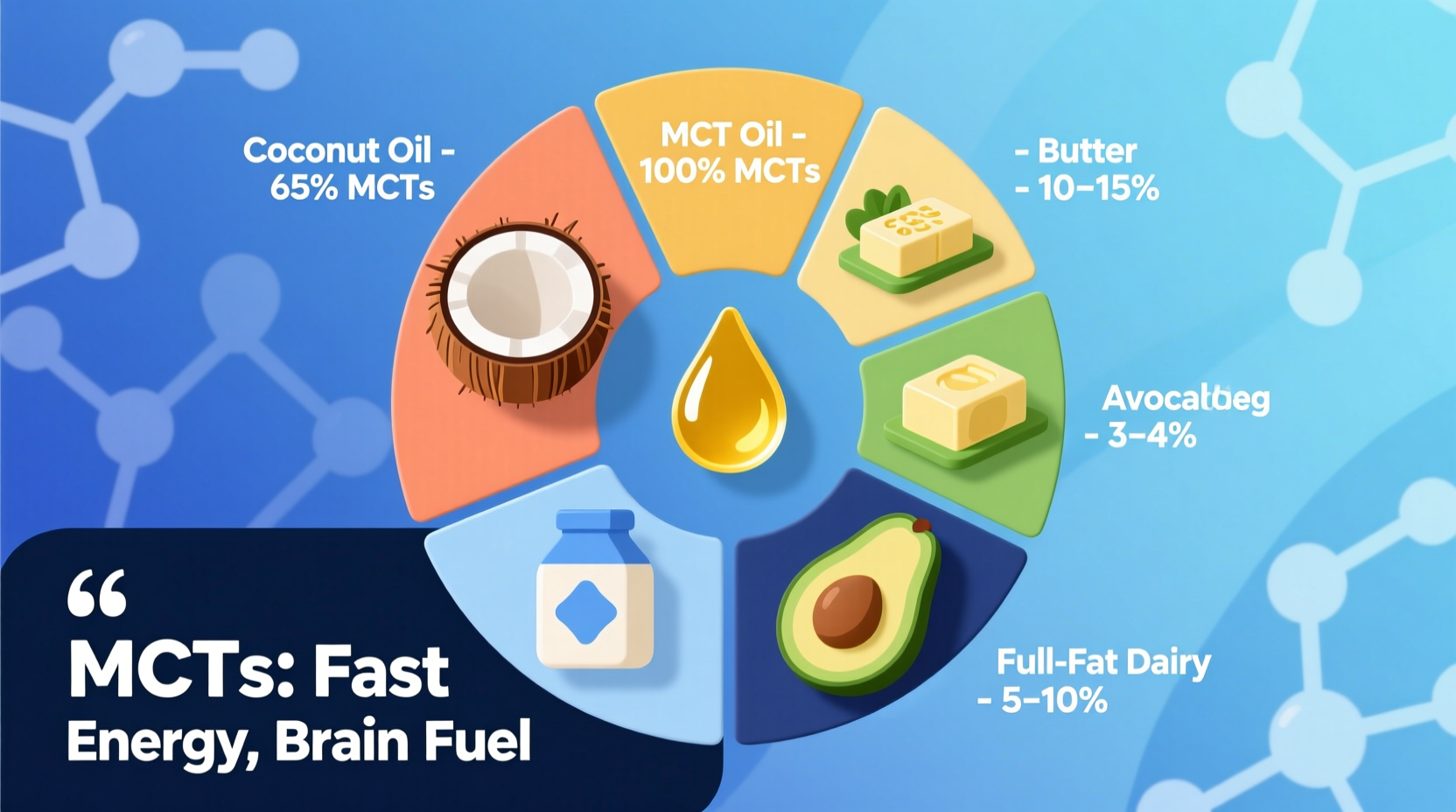Discover exactly which foods contain meaningful amounts of medium-chain triglycerides (MCTs) and how to effectively incorporate them into your daily nutrition. This guide cuts through supplement marketing hype to focus exclusively on whole food sources backed by nutritional science.
What Exactly Are MCTs and Why Food Sources Matter
MCTs are unique fatty acids metabolized differently than longer-chain fats, providing quick energy without requiring bile for digestion. While MCT oil supplements dominate the market, whole food sources offer additional nutrients and balanced fatty acid profiles. Understanding natural MCT content helps you make informed dietary choices without relying on processed products.
Natural Food Sources Ranked by MCT Content
Not all "MCT-containing" foods deliver meaningful amounts. This evidence-based ranking shows actual MCT percentages in common foods, verified through USDA nutritional databases and peer-reviewed research:
| Food Source | Total MCT Content | Primary MCT Types | Practical Serving Size |
|---|---|---|---|
| Coconut oil | 54-57% | C8, C10, C12 | 1 tbsp (14g) |
| Palm kernel oil | 48% | C8, C10, C12 | 1 tbsp (14g) |
| Butter (grass-fed) | 8-10% | C8, C10 | 1 tbsp (14g) |
| Hard cheeses | 6-8% | C8, C10 | 1 oz (28g) |
| Whole milk | 5-7% | C8, C10 | 1 cup (240ml) |
Source: USDA FoodData Central and National Institutes of Health research on dietary MCTs
Coconut Products: Beyond Just Oil
While coconut oil contains the highest concentration, other coconut products provide valuable MCTs with additional fiber and nutrients:
- Unsweetened coconut milk: 15-20% MCT content per serving
- Shredded coconut: 10-12% MCT content (1/4 cup serving)
- Coconut cream: 25-30% MCT content (higher fat concentration)
Processing affects MCT levels - cold-pressed, unrefined coconut products retain more medium-chain fatty acids than refined versions. For maximum MCT retention, choose products labeled "virgin" or "unrefined" with minimal processing.

Dairy's MCT Profile: What Most Guides Get Wrong
Many sources oversimplify dairy's MCT content. Research shows significant variation based on animal diet and processing:
- Grass-fed dairy contains 20-30% more MCTs than conventional dairy
- Fermented dairy (yogurt, kefir) maintains MCT levels while adding probiotics
- Cheese aging concentrates MCTs as water content decreases
- Heavy cream contains higher MCT percentages than whole milk
A 2023 USDA Food Composition Database update confirmed these variations, helping consumers make more precise dietary choices.
Practical Incorporation Strategies for Daily Nutrition
Maximize MCT benefits through these chef-tested techniques that preserve nutritional integrity:
For Cooking Applications
- Use coconut oil for low-temperature sautéing (under 350°F/177°C)
- Substitute butter for olive oil in dressings for added MCTs
- Create dairy-based sauces using full-fat coconut milk
Diet-Specific Integration
- Keto dieters: Add 1 tbsp coconut oil to coffee instead of MCT oil
- Athletes: Consume hard cheese with fruit for balanced pre-workout fuel
- General wellness: Replace refined oils with grass-fed butter in cooking
Important Context and Limitations
MCT foods aren't universally beneficial. Consider these evidence-based limitations:
- Digestive sensitivity: Start with small servings (1-2 tsp) if new to high-fat foods
- Caloric density: MCT foods remain high in calories despite metabolic benefits
- Dietary balance: Excessive coconut products may skew fatty acid ratios
- Medical conditions: Consult your physician if managing pancreatitis or gallbladder issues
The American Heart Association recommends limiting saturated fats to 5-6% of daily calories, which includes MCT-containing foods. Balance remains key for sustainable nutrition.
Research Evolution: How Our Understanding of Dietary MCTs Has Changed
Nutritional science around MCTs has evolved significantly in recent years:
- 2010-2015: Early research focused almost exclusively on supplemental MCT oil
- 2016-2019: Studies began comparing whole food vs. supplemental MCT effects
- 2020-2022: Research confirmed dairy's MCT variations based on animal diet
- 2023-Present: Current focus on balanced whole-food approaches over isolated supplements
This timeline reflects a broader shift toward whole-food nutrition science, with the NIH now emphasizing food matrix effects in their Dietary Guidelines for Americans.
Final Considerations for Informed Choices
Natural MCT sources offer more than just medium-chain triglycerides - they provide complete nutrient profiles that isolated supplements cannot match. When selecting MCT-containing foods, prioritize:
- Minimal processing to preserve natural fatty acid composition
- Sustainable sourcing, especially for coconut and palm products
- Balance within your overall dietary pattern
Remember that no single food provides complete nutrition. Incorporate MCT-rich foods as part of a varied, whole-food diet for optimal health outcomes supported by current nutritional science.
Frequently Asked Questions
Does avocado contain MCTs?
Avocados contain primarily monounsaturated and long-chain saturated fats, with negligible MCT content (less than 1%). While exceptionally nutritious, avocados aren't considered a meaningful MCT source compared to coconut or dairy products.
How much coconut oil should I consume daily for MCT benefits?
Nutritionists recommend starting with 1-2 teaspoons daily and gradually increasing to 1-2 tablespoons maximum. Consuming more than 2 tablespoons daily may cause digestive discomfort. Always incorporate coconut oil as part of your total fat intake rather than adding it to an already high-fat diet.
Are MCTs in dairy better absorbed than those in coconut oil?
Research shows similar absorption rates for natural MCTs from both sources. However, dairy MCTs come with additional nutrients like calcium and conjugated linoleic acid (CLA), while coconut MCTs accompany fiber and other phytonutrients. The food matrix affects overall nutritional impact more than absorption differences.
Can I get enough MCTs from food alone without supplements?
Yes, most people can obtain sufficient MCTs through whole foods. Consuming 1-2 tablespoons of coconut oil plus regular dairy products typically provides 15-25 grams of MCTs daily, which meets research-backed intake levels for potential benefits. Supplements become relevant only for specific therapeutic protocols under medical supervision.











 浙公网安备
33010002000092号
浙公网安备
33010002000092号 浙B2-20120091-4
浙B2-20120091-4